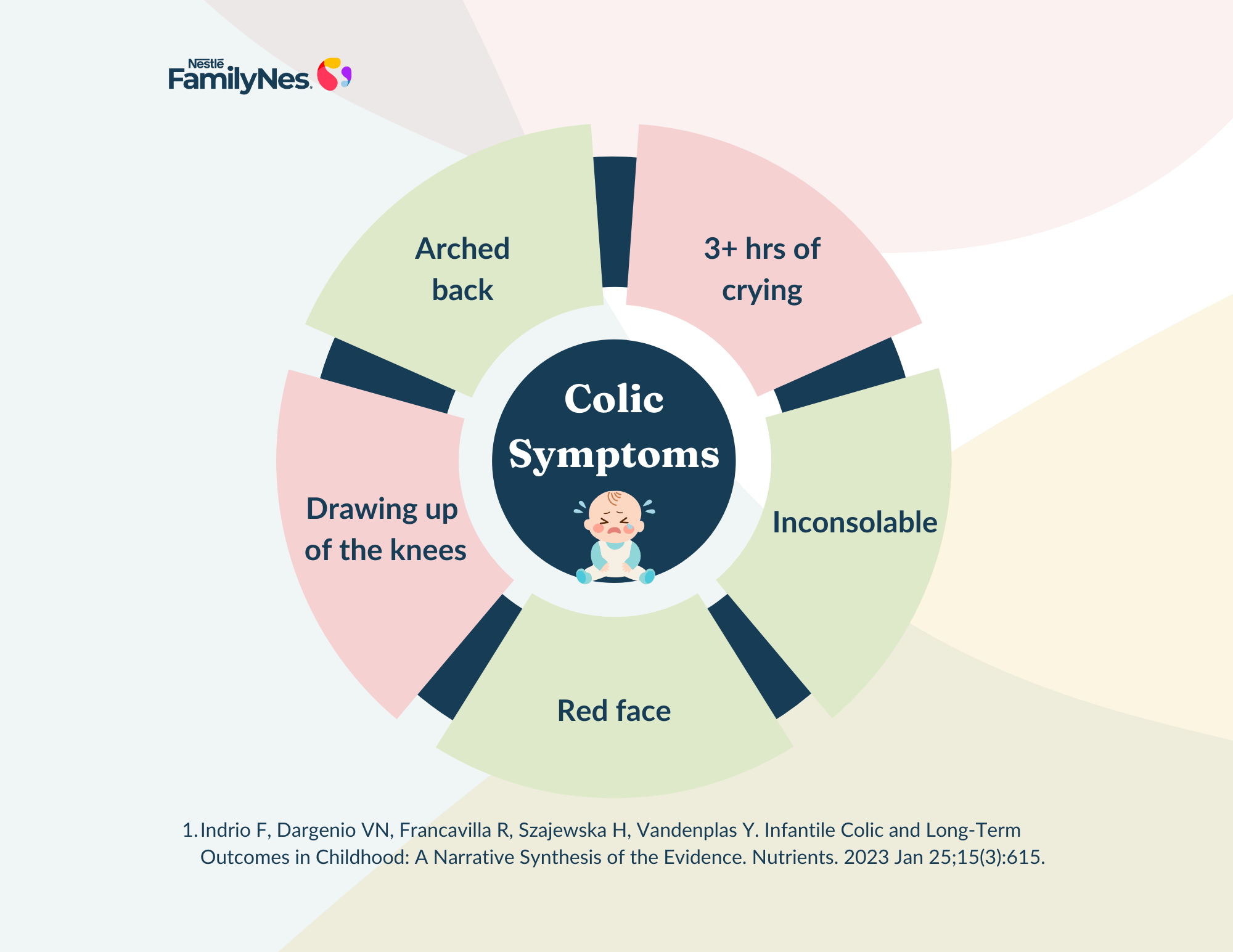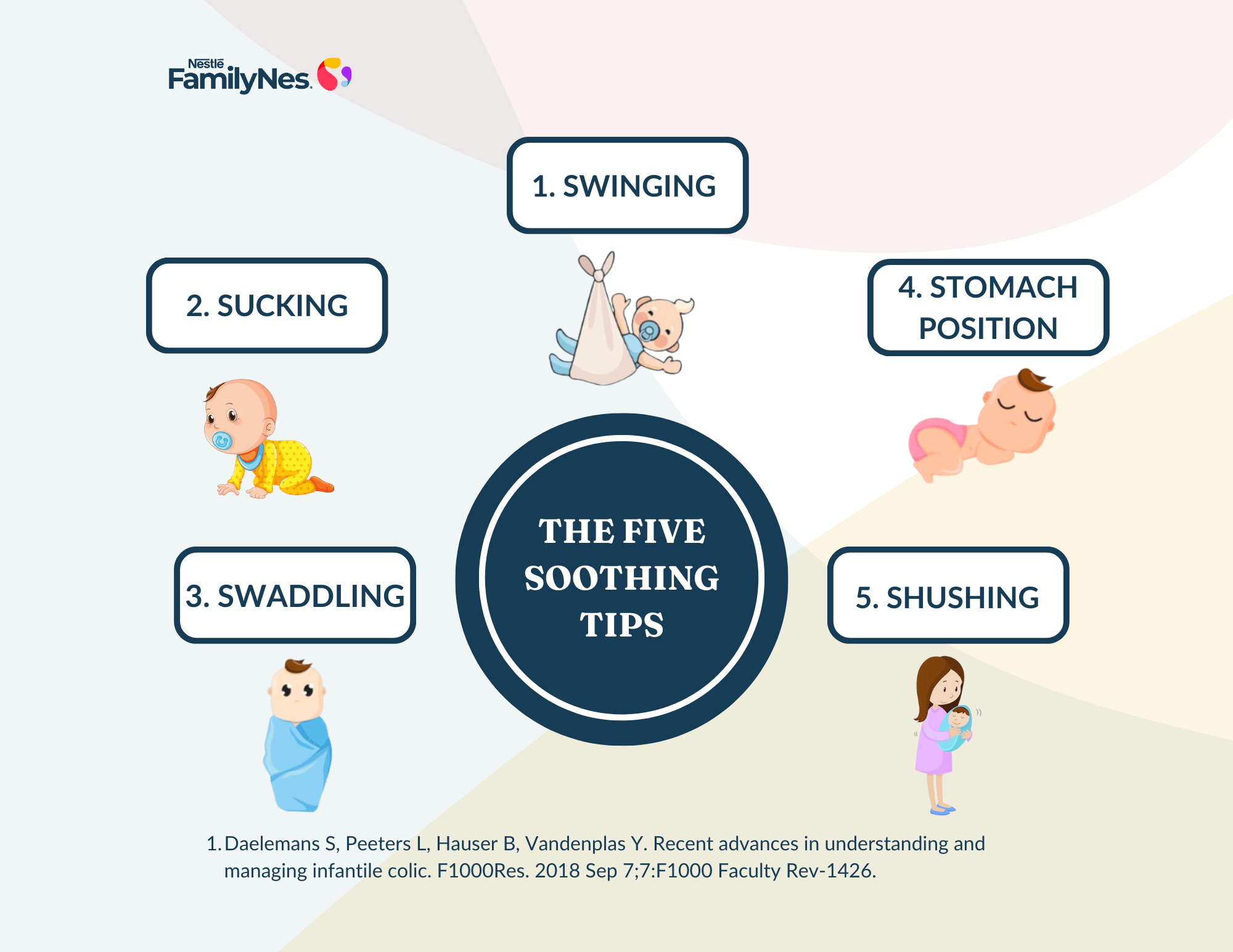
What does your baby’s cry mean: Common tummy troubles & when to seek help
As a new mother, you know that crying is a baby’s way of telling you something but when the crying feels endless, especially when they have already been fed, changed, and cuddled, it can be exhausting and leave you wondering what’s wrong. In many cases, tummy troubles are the culprit.
Babies have delicate digestive system that is still developing, and this can lead to a few common but harmless group of tummy issues known as Functional Gastrointestinal Disorders (FGIDs). A few of the issues from this group usually go away on their own by 4-5 months as the baby gets older, but in the moment, they can be frustrating for both you and your baby and can also have an impact on the daily quality of life.1,2 Let’s break down the common tummy troubles and what you can do to help.

How Common Are FGIDs in Infants?
Half of all babies experience one or other form of tummy trouble. The most common issues include colic (frequent crying that seems unexplained), spit-up/ regurgitation, and constipation. Less commonly babies may also experience diarrhea and vomiting.2,3
One of the most frustrating tummy troubles is colic which affects one in ten babies.4
If your baby is inconsolable especially in the evening hours or crying for over 3 hours a day and happens more than three days a week for at least 3 weeks and nothing seems to soothe them, it’s a good idea to check in with your doctor to rule out any other possible causes and get reassured on how to soothe them.2
Did you know? Colic is so common in the first six weeks that it occurs in almost 17-25% of infants.3
Colic is not associated with any long-term medical condition, but it can be frustrating for parents and may lead to extra visits to the doctor. It can be triggered by tummy discomfort or behavioral fluctuations. Some experts also believe that an imbalance of good and bad bacteria present in the gut might play a role.4,5 Research suggests that probiotics such as L. reuteri may help in preventing colic. It also helps in managing many FGIDs like colic, and constipation.6 However, it’s always best to consult your pediatrician before making any change/ addition to your baby’s diet.
Evening colic is the most common FGID in infants. Its exact cause remains unknown, but it typically resolves on its own by 3 to 4 months of age. In the womb, there is no distinction between day and night for babies, so their sleep patterns are not fully developed at birth. It usually takes around 3 to 4 months for them to adjust. As a result, many babies tend to sleep during the day and wake up to feed and cry at night. Therefore, it’s important for mothers to maintain a balanced diet and try to align their sleep schedule with their baby’s sleep patterns.
Other Common FGIDs
Spit-up/ Regurgitation:
Spit-up is when a thick curd-like substance comes back after feeding. Do not worry, it is not vomiting and is completely normal. That is why burping after feeding is important. Spit-up or regurgitation happens as your baby’s digestive system is still developing.
What can help?
- Feed your baby in an upright position
- Burp them after feeding gently but frequently
- Avoid overfeeding.4
Functional Constipation:
Constipation happens when a baby has hard stools or goes several days without pooping. It can be caused by a low-fiber diet or a family history of constipation. To help relieve constipation, you can try offering your baby more fluids and fiber-rich foods (if the baby is >6m and has already started solids). Gentle tummy massages and leg exercises (like the bicycle motion) may also help. Medication is usually not needed unless recommended by a doctor.
When to Seek Medical Help?
Most tummy troubles go away on their own, but sometimes it’s best to get medical advice.
Watching your baby cry for hours is tough, and it’s okay to feel frustrated, exhausted, and even helpless. But remember, you’re not alone, and this phase won’t last forever. FGIDs, including colic, are a normal part of infancy. The good news is this can be managed. Some soothing tips as demonstrated in the figure below. Soon enough, this will just be a memory, and your little one will be happy, smiling, and sleeping soundly!
Trust your instincts, be patient with yourself, and ask for help when you need it.
References
- Hyman PE, Milla PJ, Benninga MA, Davidson GP, Fleisher DF, Taminiau J. Childhood Functional Gastrointestinal Disorders: Neonate/Toddler. Gastroenterology. 2006 Apr 1;130(5):1519–26.
- Vandenplas Y, Hauser B, Salvatore S. Functional Gastrointestinal Disorders in Infancy: Impact on the Health of the Infant and Family. Pediatr Gastroenterol Hepatol Nutr. 2019 Apr 16;22(3):207.
- Indrio F, Dargenio VN, Francavilla R, Szajewska H, Vandenplas Y. Infantile Colic and Long-Term Outcomes in Childhood: A Narrative Synthesis of the Evidence. Nutrients. 2023 Jan 25;15(3):615.
- Garg P. Prevalence of infantile colic at a secondary level hospital. Indian J Pediatr. 2004 Nov;71(11):1039.
- Daelemans S, Peeters L, Hauser B, Vandenplas Y. Recent advances in understanding and managing infantile colic. F1000Research. 2018 Sep 7;7:F1000 Faculty Rev.
- Muhardi L, Aw MM, Hasosah M, Ng RT, Chong SY, Hegar B, et al. A Narrative Review on the Update in the Prevalence of Infantile Colic, Regurgitation, and Constipation in Young Children: Implications of the ROME IV Criteria. Front Pediatr. 2022 Jan 5;9:778747.
- Indrio F, Di Mauro A, Riezzo G, Civardi E, Intini C, Corvaglia L, et al. Prophylactic Use of a Probiotic in the Prevention of Colic, Regurgitation, and Functional Constipation: A Randomized Clinical Trial. JAMA Pediatr. 2014 Mar 1;168(3):228–33.


